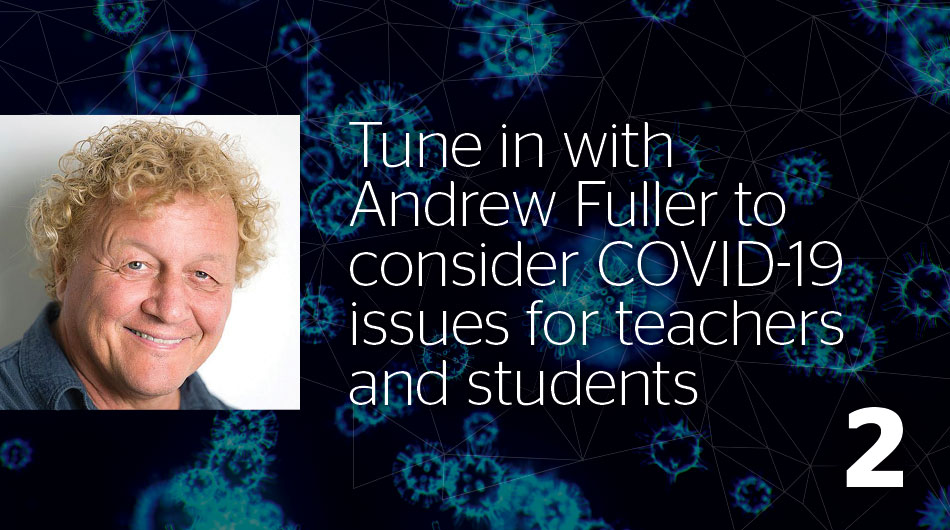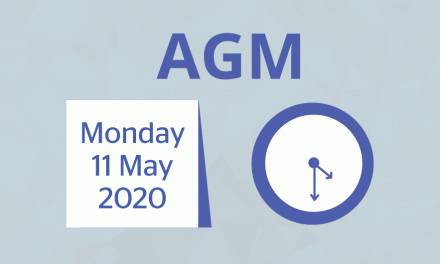Tune in with Andrew Fuller to consider COVID-19 issues for teachers and students
Talking to young people about coronavirus (COVID-19)
Phase one—Bewilderment and fear
The role of parents and adults in talking to young people through this time is crucial.
As the situation progresses the types of challenges we will face will change, as will the general reactions of most people to them. This process will most likely follow some fairly predictable stages.
I will release a series of statements over the weeks as I feel people generally have reached the next stage of coping with the virus. The conversations parents will need to have with their children will change as we go through this.
The general patterns of people’s reactions have been identified from how populations responded at different stages to the influenza outbreaks of 1918–20 and 1957 in Singapore and the USA, as well as to the outbreaks of SARS, HIV and bird flu (H5N1).
The current challenges to us all heighten and amplify everyone’s feelings. Young people and children will vary in their feelings, with some appearing to be relatively unconcerned while others may be restless and sleepless. Let’s consider ways to get through this initial phase successfully.
The predominant feeling in this first phase will be one of bewilderment and panic driven by fear. At times you will feel you may be overreacting, at others you might wonder whether you are under reacting. Uncertainty is common during this stage.
Conflicting messages about levels of risk will drive fear and we have already seen hoarding behaviours as people attempt to protect themselves from being impacted.
Clearly when a society has such a powerful reaction to an outbreak, the effects are transmitted to young people.
What young people may think
Fears of death are common at the best of times in middle childhood and can become worse in teenagers who can sometimes be prone to morbid thoughts. And, as we are all aware, these are not the best of times.
This may cause in young people an overestimation of the likelihood of fatality for either themselves or other family members, resulting in clinginess, checking on everyone’s whereabouts or frantic distraction (often through compulsively playing computer games).
Others may become reckless as if engaging in death-defying behaviour will prove to them that they are stronger than this threat.
A few young people will be able to express their fears directly and be able to have conversations where risks can be appraised objectively.
What young people may feel
Awareness of their own feelings will vary between young people. Some will sense fear acutely and may experience disturbed sleep. Other will be out of sorts and grumpy with little understanding that their feelings arise from changed circumstances.
What you may see
How young people deal with fear varies. While some young people may initially see this as an enforced holiday with an opportunity to binge on their favourite computer games, other may be irritable and be atypically reactive to disruptions and changes.
Transition times at home (bedtimes, mealtimes, getting up in the morning and stopping playing computer games) may create high friction. Ease into these changes slowly.
Handling the stress of being with your children as much as 24/7 is something I’ll discuss in an article on the next stage.
When the world feels uncontrollable some people become controlling. Controlling behaviour can concern personal belongings, family members’ comings and goings, and siblings’ behaviour. This also explains why some young people will become so fixated on playing computer games. When the world feels uncontrollable, you gravitate towards the things you feel you can control.
Other children become more primitive. One sign of this is some children demanding severe reprimands and punishments if their siblings engage in minor misdemeanours. When parents (wisely) do not comply, criticism will be hurled at them.
What you may consider doing
Be a cool and collected parent as much as you can. You may need to find a safe place for yourself at times where you can re-collect yourself—sitting alone in your car, for example.
Try to keep family routines as stable as possible. If you are spending more time with one another, attempt to give each family member as much space as they need. You may even consider developing a signal that indicates to others that an individual needs some alone time.
Uncertainly about money, work stability, food availability and health status puts pressure on us all. Plan as much as you can but don’t turn this time into a catastrophe.
Siblings spending too much time together is often a recipe for conflict.
This is not the time to severely restrict screen-time. Young people use devices to socialise and will need to do so over the coming weeks. Gaming is a good source of connection with others and is also a distraction.
Don’t be at your children’s beck and call all day long. This depends of course, on their age but try to keep some time for yourself.
If you enter a room to find a child or teen draped across a couch in idle bliss, I recommend you do not speak as your first words, ‘Haven’t you got work to do?’.
Don’t binge on news updates. Instead, stay well informed by accessing high-quality sources no more than once a day.
What you may consider saying to young people
- ‘These are uncertain times. We don’t know how long this will last.’
- ‘The best minds around the world are already working on vaccines and ways to prevent us getting sick.’
- ‘This is awful but it is not the entire world and the way we feel now is not going to be the way we will always feel.’
- ‘We will do everything we can to make sure that you and our family are safe.’
- ‘Even if one of us does get sick, the risk of becoming seriously ill is low.’
- If they ask, ‘Will I die?’, your best answer is, ‘No.’
- ‘The world has been through health challenges like this before and come through them, and we will again.’
Andrew’s books, Tricky Teens and Tricky Kids (Bad Apple Press) may be useful during these times.
Phase two—The anger stage
Someone once sang something along the lines of, ‘You can check out anytime you like but you can’t leave any time soon.’ It seems to sum up our current situation.
Imagine for a moment you have a slightly cantankerous, mood-swinging roommate with a volatile temperament and erratic work habits. Imagine you decide to take on the task of helpfully informing your roommate about how to improve their lives. Imagine how well that might work out.
This is the phase that gets a bit tetchy. People have been bunkered in and space feels limited. It might be siblings scraping their egos and entitlements against one another. It might be the sounds of a computer game being played at 2 am in spite of your clear instructions to, ‘Turn that damn thing off and go to sleep’.
This is the phase where the household could splinter into factions, when vendettas and reprisals might lurk in the air. It is time to take stock. The most important person to calm in this phase is you. It is time to regain your equanimity.
Put some soothing music on, bake something, read a treasured childhood story—do whatever you need to, but attempt to regain your senses.
We have all been through a major adjustment. Some people have moved from overload to underload. The aftershock of fear is exhaustion and a tendency to ask, ‘I’m hurting. Who made me feel this way?’.
While we may not yet have all the answers to our worries, it is time to revert to what gives us comfort. It is time to deal with blame and start to move towards kindness.
Find an antiviral
We have all been so deluged by news about the virus it is time to step back and limit our exposure to the media. Find an antidote in comedy shows or favourite films, or by revisiting treasured children’s books.
Distance matters
Being cooped up with even the finest people can wear a little thin after some time. Try to allocate ‘retreat’ spaces for each person in the household. These are spots where people can go for some time out and some privacy. As much as you can, try to respect family members’ needs to be left alone in those places.
Specified spaces
As well as retreat spaces, try to nominate areas for project work, creative undertakings, communal activities and quiet areas. I realise this is not possible in everyone’s household, but where it is, do it.
Develop a creativity corner. Ideally have some place where kids can start a project and leave it to come back to after some deliberation. Having to pack up a project in progress can be frustrating and dampen enthusiasm for it.
Drip-feed parenting
Many older children and teenagers are not accustomed to intensive parenting. For some, small moments of parenting go a long way. Some parents will look on this time as an opportunity to really enjoy more one-on-one time with their children. The only problem is, some kids are not quite so keen. In these cases, short bursts of parenting work best.
Cool downs and meltdowns
Now as the sparks fly and the tempers flare you need to know how to read your kids.
Cool downs are times when things get a bit too tense. Ideally you will have had an earlier chat at a calmer time about what they think will help if they get upset or antsy. Some kids need a calm adult to listen and a shoulder to cry on while others need space and time.
Meltdowns are an entirely different matter. During a meltdown people are out of control and nothing you do will make a skerrick of difference. During meltdowns you have two priorities:
- Keep people safe.
- Resume calmness as soon as possible.
What helps kids to be safe varies. Some kids need to leave and be alone. They calm best by themselves. Other kids, if left alone, go totally troppo. Make a safety plan now for meltdown moments if they do occur.
What young people may think
Young people may become unrealistically pessimistic about their futures or about the likelihood of becoming ill. Others may act as they have a special immunity to any threats and act in reckless ways.
What young people may feel
Fear and anxiety will remain for some young people, as they feel preoccupied by threats. Others will convert these feelings into anger and blame the people closest to them for not being able to protect them or to preserve their normal lifestyle. This may especially be the case if a parent has lost a job or income and is feeling dejected. Some children can decide that it is better to have an angry parent than a sad one.
What you may see
If the situation itself isn’t erratic enough, you also get to see unpredictable behaviours occur at this time—for example, sleep disturbance; high-voltage outbursts followed by teary neediness; or an insistent focus on computer games where kids can regain a sense of control. This means parents need to deal with issues, feelings and behaviours as they arise rather than saying, for example, ‘But we had such a lovely morning together and you were happy then’.
What you may consider doing
The person is not the problem—the problem is the problem. Whatever issues you are facing during this time, it is essential that you do not confuse problems with people. Many people, kids especially, feel disjointed and confused and express their distress through their behaviour. They are not their usual selves.
What you may say
The most effective strategy in responding to distressed or fearful kids is to provide simple responses that acknowledge emotions such as fear, worry or loneliness.
These are tough times but we won’t always be in tough times. Everyone is more worried than usual.
It is important to be clear but not to be unrealistically optimistic.
We don’t know how long this will go on for but we do know it won’t go on forever.
Don’t give too much advice. Kids often just want to be heard. Rather than giving advice, ask your kids what they think would help them to feel less lonely / scared / bored.
Your family may develop a code word that effectively means, ‘I need some time out right now’.
This is not the time for platitudes of gratitude. Even if your family are relatively protected compared to others, pointing it out to your kids often leaves them feeling unheard about their fears and anxiety.
Be kind.
Andrew’s books, Tricky Kids and Tricky Teens (Bad Apple Press) may be helpful at this time.
Copyright Andrew Fuller, 2020
Stay in touch with Andrew
![]()
![]()
![]()
I would be delighted if this article creates a conversation. If you would like to make suggestions about this issue you could raise them by emailing Andrew at inyahead@satlink.com.au





